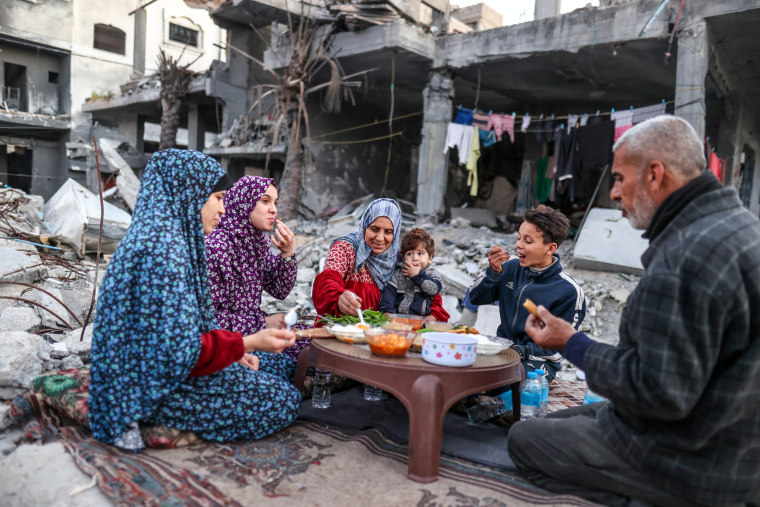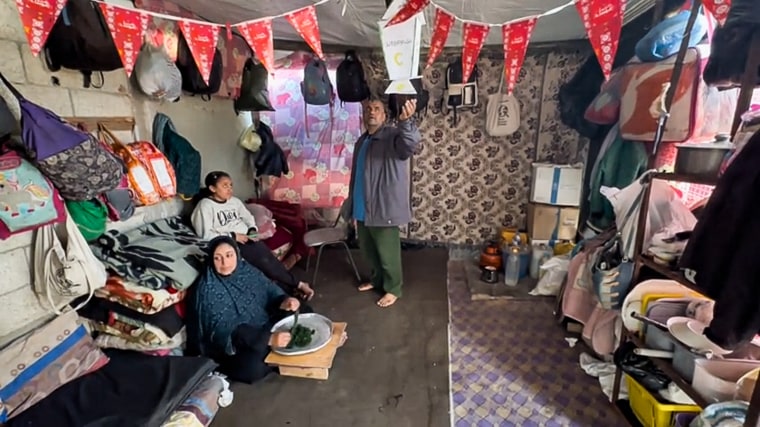On the eve of Ramadan, Hussein Owda and seven members of his family sat down for suhour — the meal Muslims eat before fasting from sunrise to sunset.
On the table in front of them were just 7 ounces of labneh, or yogurt cheese, and some bread.
“We didn’t finish it, because we are used to eating small amounts of food,” Owda, 37, told NBC News in a telephone interview.
The computer engineer, who was displaced to Rafah in southern Gaza, said he has lost about 65 pounds since the war between Israel and Hamas began on Oct. 7. Owda, like others NBC News spoke to, said he and his family had been forced to fast for about six months. Now that Ramadan has started, the only difference is that the fast is scheduled.
The ninth and most sacred month of the Islamic calendar, Ramadan is when Muslims believe the first verses of the Quran were revealed to the Prophet Muhammad. Around the world, millions who are able will fast during daylight hours to try to strengthen their connection to God and practice discipline and compassion for the less fortunate. Self-reflection, gratitude and celebration among community are at its core.
In Gaza, the usually joyous season marked by gatherings over traditional food and congregational prayers is unrecognizable. Homes once decorated with lights have been reduced to rubble, and tables once surrounded by families and laden with food are bare.
Amid a worsening humanitarian crisis in the enclave, where more than 31,000 people have been killed and over 25 have died of starvation, according to Gaza officials, many Muslims are seeking refuge in God and observing the fast as a testament to their unwavering faith during profound hardship.

Looming famine and broken traditions
On the first day of Ramadan, Salem Sbeta, 48, and his family traditionally eat chicken and molokhia, a stew made of jute leaves. Shopping and preparations for Ramadan would start a month earlier and include decorating the home and buying ingredients for traditional sweets, like qatayef — sweet stuffed pancakes — to eat after sunset.
“Normally we’d all be gathered, the whole family would be with me,” said Sbeta, who was displaced from Al Shuja’iyya, a neighborhood of Gaza City, to Rafah. “We’d be in the house, feeling safe. We had electricity, cold water, a fridge, juices. We made coffee.”

This year, handmade Ramadan decorations festoon the makeshift tent shared by nine family members.
“Today, of course, as you can see, there’s no gas. We cook on a fire we make ourselves that burns our hands,” he said.
Infinitely worse than their surroundings are the missing family members: One son was killed in the violence and another one was wounded.
“I used to knock on their doors and say, ‘Get up, it’s time for suhour!’” Sbeta’s wife, Sabah, said tearfully, referring to the meal eaten before sunrise. “I can’t do that anymore.”
The family that remains is trying to celebrate. This year, Salem Sbeta was able to provide molokhia for his family for iftar, or breakfast, on the first day of Ramadan. It cost him the equivalent of $8 for just over 2 pounds; before the war, the same amount would have cost a little over $1 for the same quantity. Sbeta, a chef by trade, has not been able to work since the war started.
The situation is even worse in northern Gaza, where many have no choice but to forage for and cook khobiza, a wild plant. Samiya Abed Jamal, who was displaced to the Jabalia refugee camp, said even this isn’t always an option.
“We did not eat suhour, we just drank water and went to bed,” she said. “We do not have bread or flour.”
“What can we do?” Jamal asked.
Muslims are encouraged to eat especially nutritious food during Ramadan, including fresh fruit and vegetables, beans, eggs, dairy and animal protein. But this year, a rich and diverse diet is impossible for a vast majority of those living in Gaza.
More than half a million Gaza residents face starvation, according to the United Nations. Meanwhile, less and less food and emergency assistance is getting into the enclave, with the amount of humanitarian aid entering Gaza falling by 50% from January to February, according to UNRWA, the United Nations agency serving Palestinian refugees.
Israeli forces have been accused of opening fire on people waiting for food, striking aid distribution sites and turning away aid trucks.
The World Food Programme has said famine is imminent in northern Gaza. Over 30% of children under the age of 2 currently suffer from acute malnutrition in the area, up from around 16% in January, UNICEF warned on Friday.
Ramadan at a soup kitchen
Mahmoud Almadhoun ran a cellphone store in Beit Lahia in northern Gaza before the war. Now the shop lies in ruins, and instead of selling phones, Almadhoun, 32, feeds the hungry at the Gaza Soup Kitchen, which is funded by a GoFundMe started by his brother who lives in Washington, D.C.











